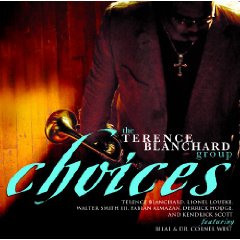 “I’m not against smartness and brains; it’s just that it falls so radically short of what it means to be human and making the right mature choices in life.”
“I’m not against smartness and brains; it’s just that it falls so radically short of what it means to be human and making the right mature choices in life.”
—Dr. Cornel West
This is one of the quotes from Dr. West that run through the album version of Choices and are triggered in live performance by a foot pedal in trumpeter Terence Blanchard’s stage setup. The outstanding young musicians who join Blanchard on this project help him demonstrate that choices are the fulcrum of our existence. It’s a teaching moment for Blanchard, a joyous affirmation of what is possible after the transcendent expression of grief in his last album, A Tale of God’s Will (A Requiem for Katrina).
On the last day of July, Blanchard returned to the spot where the album was recorded, the Patrick F. Taylor library at the Ogden Museum complex, to play the music from Choices before a live audience. The event had a dramatic arc that encompassed the meaning of this music in a larger context. The packed house followed every contour of the music’s journey and appeared energized by it. The magnificent, cathedral-like structure built by the 19th Century architect Henry Hobson Richardson was a player in this numinous spiritual event, achieving the designer’s dream of constructing a house of worship for the mind and heart. And while the music was subtly different from the recording itself, the program gathered a cumulative power in person that the record can’t completely match, in large part because this unit is made for improvisation, with the intuitive communication and elevated spirit of the great Miles Davis quintet of the mid-to-late 1960s. Blanchard’s plangent trumpet playing and Walter Smith III’s tenor saxophone blend in a gorgeous signature theme, and Smith produced a prodigious solo on his own composition written for the Monk Institute, “Him or Me,” one of the highlights of the album and the evening.
All of the musicians contributed impressive set pieces, just as on the record. Pianist Fabian Almazan was particularly dazzling, playing beautiful ensemble work and electrifying the crowd with several magnificent solos that worked so perfectly inside the room’s warm, generous acoustic space that they sparkled like gems against a perfect foil. Drummer Kendrick Scott, who Blanchard said was the best drummer he ever worked with, played with the power of a marching band and the nuance of a symphony, offering dramatic shading throughout.
Blanchard’s trumpet playing is aural poetry, and the beauty of his solo constructions mirrored the gravitydefying exhilaration of the library’s massive vaulted wooden dome. On the title track, a gorgeous ballad, Blanchard’s long, emotive trumpet solo, building to searing high note punctuations, had the dramatic impact of a Shakespeare soliloquy. Vocalist Bilal provided two set pieces that brought their own dramatic flow to the presentation, with the singer adding to the evening’s improvisational experience with hand gestures and body language. C
hoices is filled with irony, not the least of which is Dr. West’s rumination on music’s superiority to the spoken word. “Beethoven said that music is deeper than philosophy,” he notes at one point. Music is the first language, and it speaks to an aspect of humanity that lies deep within our being, part of our animal nature, our instinct. It can lead us to meditation and prayer, or to war, with equal fervor. In the case of New Orleans, it can lead us to nothing less than recovery, and this night at the Ogden, Blanchard showed us how noble our choices can be if we choose to rebuild our culture on the sturdy foundation of music and art.




